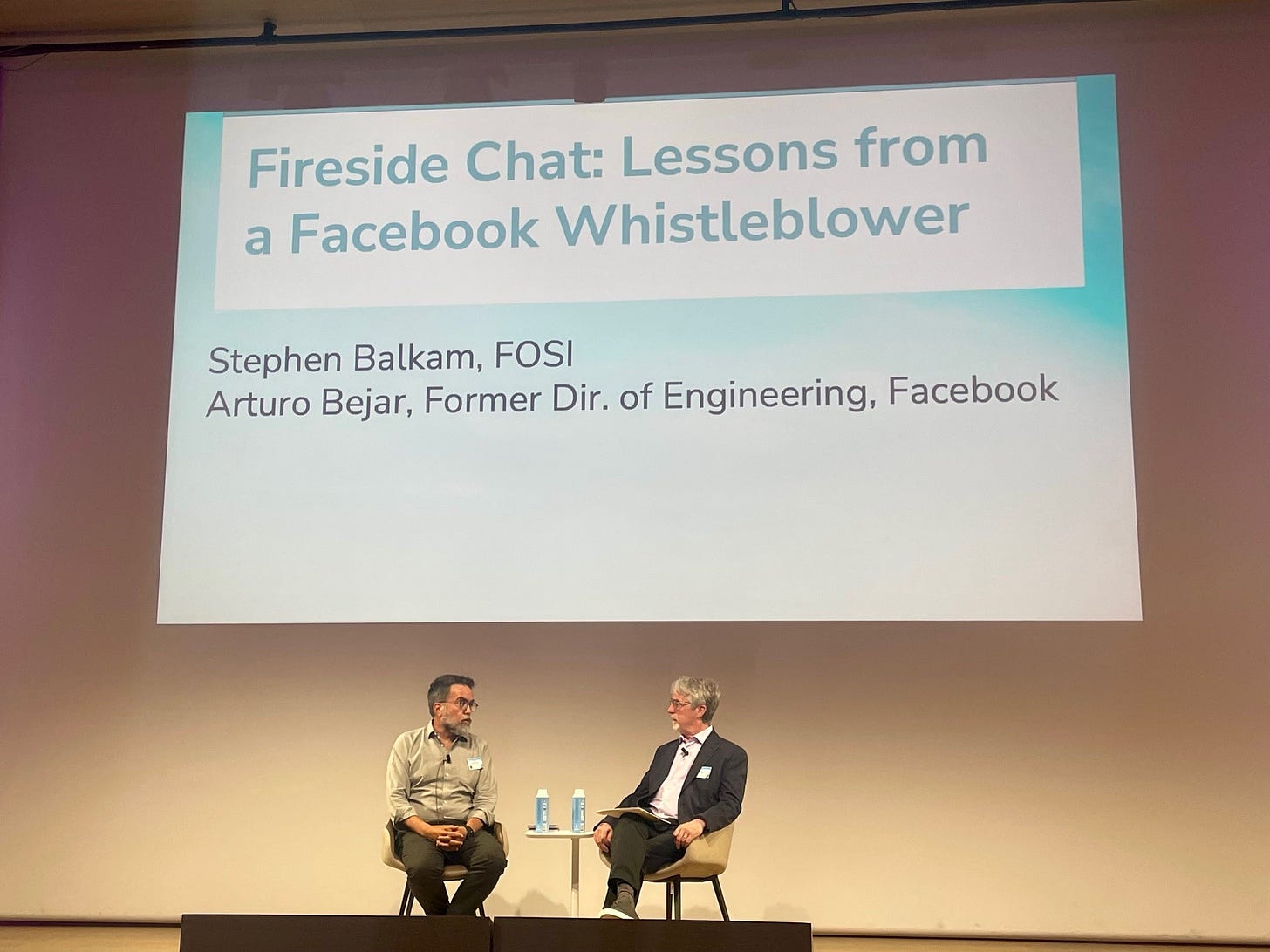Your child’s rights and smartphone design
Why you're not a bad parent and it's not your fault. Raising kids in the digital age does not need to be this hard and parents and kids are paying the price.
Since coming back from my research trip to California the #smartphonefreechildhood movement has gained phenomenal momentum, with tens of thousands of parents joining local and regional WhatsApp groups across the country.
This group, along with the Delay Smartphones campaign aims to de-normalise smartphone ownership for kids and remove smartphones from schools. The attention and pressure they have applied has forced school leaders to review their policies, resulting in St Albans schools going smartphone free and paving the way for others to do the same, like this group of Southwark schools. They’ve even forced discussions in parliament, elevating this debate to the mainstream, which can only be a good thing, whatever your views.
I’ve also been busy myself - speaking at an event with the Coram Society about modern childhood, updating my skills with some more Family and Relationships coaching training (I am a life coach amongst other things) and visiting our kids primary school and another local Secondary to help advise them as they review their smartphone policies.
I also concluded my Churchill Fellowship research by attending a conference in Paris with the Family Online Safety Institute (FOSI) where, as luck would have it, the first person I happened to meet at the coffee stand turned out to be the brave Facebook and Instagram whistleblower, Arturo Bejar, whose testimony to a high profile American court case exposed the gap between what big tech says and does behind the scenes to protect young people.
Turns out that not only do Arturo and I share a mutual appreciation for Parisian pastries, (is three in one morning too many?!) we also share a frustration around big tech companies shunning their social responsibilities towards young people. It felt good to meet a kindred spirit.
What I took away from Arturo’s inspiring closing speech was indefatigable confirmation of what I have long suspected – that children and young people’s rights are not merely an afterthought in the design of smartphones and social media but are often wilfully ignored, despite design solutions being readily available that could easily reduce many of the immediate harms that they are encountering on a daily or weekly basis.
Arturo personally led the team that was responsible for enhancing young people’s experiences of social media at Facebook, and later advised Instagram. He felt good about his work, designing sensible, straight-forward solutions to issues young people would flag to them, like getting unsolicited sexual advances from strangers or friends in their DMs. The answer was often as simple as adding a button or tweaking the wording of a report feature to make it easier for young people to confidently flag up abusive contact, and then issue friendly warnings to offenders to ease up on their behaviour (many don’t realise what they are doing in inappropriate), before finally limiting their use after repeat offending for those who persist.
Arturo moved onto other things believing his work was in safe hands, and years passed. But these easy tweaks were ignored by Executives, despite them knowing full well the damaging consequences it was having on kids. It wasn’t until Arturo’s own daughter was victim to abuse did he realise that his work had amounted to little and, after one more attempt to get Instagram to address the issue, he reluctantly accepted that companies were simply not willing to act, despite the human cost, until they were financially incentivised or otherwise forced. (Read the full story).
When the topic of the #smartphonefreechildhood campaign came up, one criticism I heard from the panel at the FOSI conference was that not giving a child a smartphone would be denying our children their right to access information and education, as per the UN Convention on the Rights of a Child (UNHRC). Well, as someone who has worked in the children and youth sector for twenty years, I think this is the perfect frame of reference for these issues, but rather than cherry pick to back our own arguments, let’s see what a more balanced reading might teach us about what young people are entitled to expect from the adults who design and profit from these addiction-machines…
The child’s right to life, survival and development – we are seeing increased rates of suicide and attempted suicide from children who themselves explicitly draw direct lines back to algorithms on social media usage that have actively pushed unsafe material in front of them. And that’s before we mention the damaging impact on body image of selfie and influencer culture, and untamed online bullying. Possession of a smartphone increases the probability of theft, assault and road traffic accidents due to loss of concentration. Parents may feel safer when their child has a smartphone because they are contactable, but the stats do not back this up. Incidentally – a brick or flip phone (plus a tag if you feel you really must track them) can provide the same opportunity for contact, without the downsides. Check out the alternatives whilst we wait for the tech industry to bring a child-friendly smartphone to the UK, like they have in the States.
The child’s right to protection from violence, abuse or neglect – Within the space of a typical week, 1 in 8 adolescents aged 13 to 15 year-olds experience an unwanted sexual advance on Instagram.1 And that’s before we get into grooming, sextortion and the prevalence of violent hardcore pornography that is shaping their early sexual experiences of children due to a lack of age verification. All ‘girls’ love to be choked during sex, right? You don’t think so? Shame. You probably wouldn’t enjoy being a teenager today then because this is fast becoming the new normal, thanks to porn culture - and it harms both boys and girls (and I do mean boys and girls, not men and women). I should add a trigger warning on that last link because this is a truly upsetting read. That said, if we parents can’t cope with simply reading about this stuff (and I do struggle myself) then how do you think our tweens and teens are coping when they see it on theirs or their friends phones? (Don’t get your child a smartphone before you’re ready to discuss pornography, guys).
The child’s right to an education that enables children to fulfil their potential – ‘Luckily’, our kids can use their smartphones to learn all about new things, like how to “do sex” from porn stars, or how to get rich and famous like an influencer. Oh, you’d rather their Sex and Relationships Education or careers education be covered in a balanced, age-appropriate way in school? Me too. Of course, the internet can be brilliant for supporting education and learning, and under appropriate supervision on a shared family device, a wonderful world of knowledge and opportunity awaits. But reading up on the news and accessing learning from responsible sources to further their personal interests tends not to be how kids use their personal smartphones, even if that’s what we would all love to believe.
The child’s right to be raised by, or have a relationship with, their parents. Great! Here is one clear way that smartphones can help - children who don’t live with their parents or close family, can use these to stay in touch thanks to the miracle of videocalls and Whatsapp / messaging. I look forward to the day when child-safe technology enables young people to access their right to safe digital contact with their loved ones, without the massive package of crap that is currently served up via a fully-internet enabled, unrestricted phone, which forces them to choose between this right and all the others that will be compromised to access it. How is your relationship with your child by the way? Because chances are you are underestimating the negative impact of your own phone use on your child… It’s not just about our kids phone use, but our own.
The child’s right to express their opinions and be listened to. Hey, Meta? You listening? I refer you back to the work that Arturo Bejar did many years ago which revealed what young people wanted to change about social media so that their feeds and DMs could be safe places. You shelved that work and have refused to listen to their views because they would inconveniently empower young people at the expense of your profits. Young people deserve a product that is safe and designed to their needs. Until your products are safe, don’t judge me for not allowing my kids to use them. You could solve this by incorporating child-centred design - for example in-built safety settings by default - but you don’t. So who is really responsible for denying my child their human rights, exactly?

Our kids absolutely deserve to have the information, opportunity, education, and joy that technology can bring. I can’t wait for the chance to give them all of this. Tech is awesome. I am totally pro-tech (who can afford not to be?!) and I strongly suspect that the parents of the #smartphonefreechildhood movement are not anti-tech either. Rather, I think this movement is borne of fearful, frustrated, loving parents who are fed up of waiting for big tech to step up to the plate and sort it out. These parents may not all be tech experts but they realise on some level that - as things currently stand - giving a child a smartphone undermines more of their rights than they enhance and they won’t sit back and take it any more.
People often criticize legislators for failing to keep up with technological advancement but in this case, I think it is big tech that is lagging behind. Parents and young people want child-friendly technology that bring the benefits, without the harms. Good honest people working for big tech want to feel proud of their work. It is not individual people - parents or developers - but profit, that is the issue here.
So, if you are struggling parent - whether you have already given your child a smartphone or not - know that it is not your fault. Yes, we have a responsibility to educate ourselves and our kids about appropriate digital usage but what they don’t tell you, is that you have been set up to fail.
Smartphones are not merely a tool, but intentionally-designed addiction machines, that detract us from our personal goals, rather than serving our higher ambitions. Both our kids and us deserve better than this and, one day, I know we will have access to beautifully designed phones that offer practical age-appropriate, stage-gated, PG-rates apps, which don’t require thousands of pages of guidance and a PHD in tech design to understand, set up, and monitor. These will offer older kids (I will still argue that younger children are better off spending the majority of their time in the ‘real world’) the ability to learn, connect and feel inspired, all without opening the Pandora’s box of inappropriate adult content and - perhaps more importantly - without the worst of the addiction-fuelled design features that keep us, and them, hooked.
The good news is that the technological ‘way’ already exists. The bad news, is that there is currently no ‘will’... The cost of curing our addiction will be paid in profits as the big tech business model can be equated to ‘more eyes on screens = more $$$’. (But you know that because you have watched The Social Dilemma, I am sure).
How long will it take? Time will tell. Meanwhile, childhood is fleeting and I don’t plan on entrusting my ten-year-old’s best interests to Meta’s social conscience. So, like many other #smartphonefreechildhood parents, I will find other creative solutions to advance her social, emotional, and intellectual development for now - and I will teach her the difference between using technology as a tool, and being used by it.
What gives me hope is that I am not on my own in feeling this way. I once felt like a lone voice, but now I am just one of many parents out there who have had enough. We parents may not have all the answers but at least they are working together to do something positive and reclaim some element of control in what previously felt like an inevitable tidal wave of smartphone obsession.
Now, the tide is turning, and it feels good.
Thanks for reading. Next time, I’ll be sharing 10 things Silicon Valley parents know about smartphones and kids, that you don’t - and some thoughts on how to stay positive when it feels like the world is going to hell in a handcart!
I’m naturally a pretty optimistic and proactive person; I don’t like dwelling on the dark side, but reading so much scary stuff about smartphones and kids has felt both terrifying and depressing at times recently. To spare my sanity, I have thought a lot about how to avoid being sucked into a doom spiral of the seeming futility of it all, and decided to focus much more on what I can do as a parent to create the childhood I want for my kids.
I will be sharing some cool experiments and projects (I think they’re cool, anyway!) that I have carried out this year on with my kids (!) that have helped me feel a ton more optimistic and grounded, and basically believe that everything is going to be alright. Because it will!







Thanks Laura. Currently trying to push our primary school to go smartphone free. It feels like once the floodgates are open it is very difficult to turn back the tide (to mix my metaphors!), but good that you have a positive spin on things. Best. Al
Thank you. Enjoyed reading and looking forward to the upcoming posts 🙏🏻